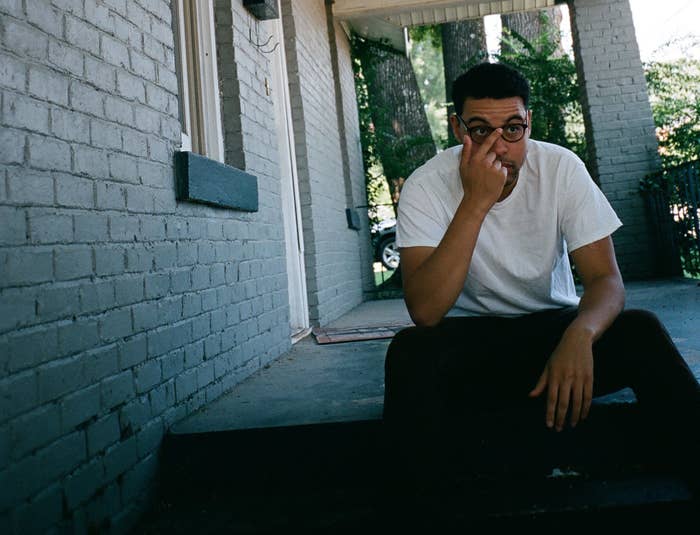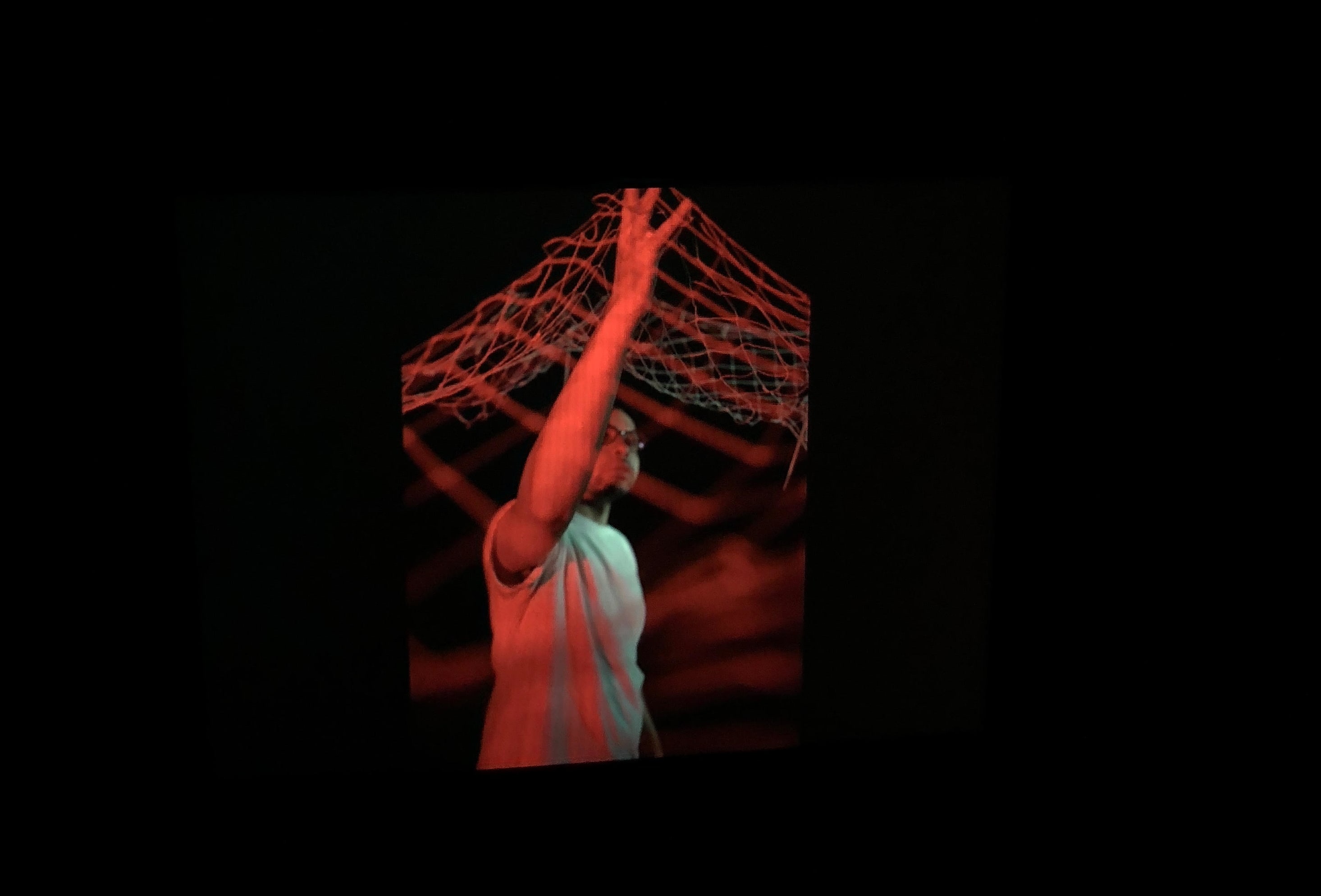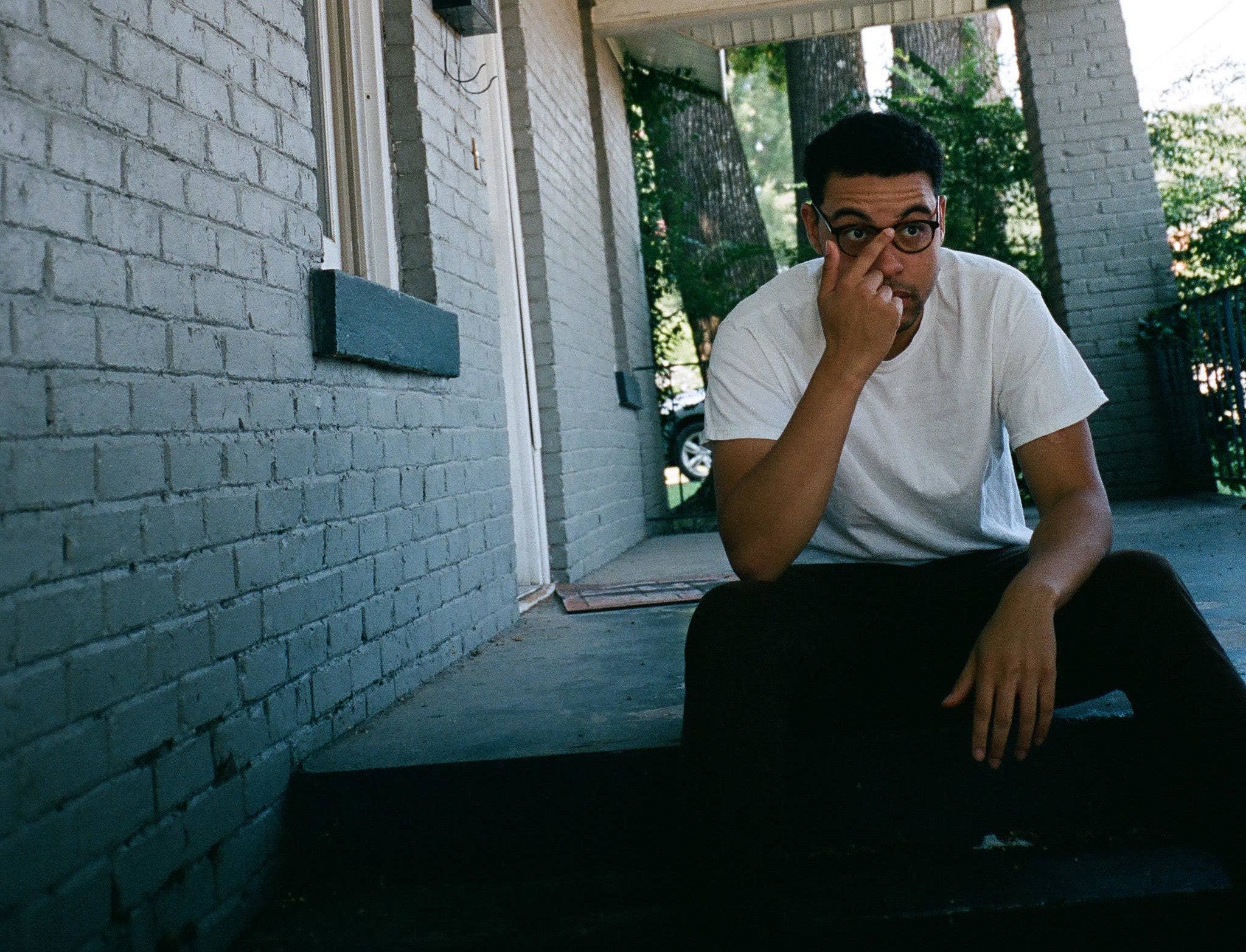
In 2016, we met up with Memphis rapper/singer/songwriter Jon Waltz at The High Line, an elevated park on a defunct rail line running through the west side of Manhattan. We were working on a short documentary, and we spent at least two hours walking, talking, and shooting video of Waltz on a cold but clear day in New York City. He was reserved and soft-spoken, but sounded optimistic. That year "Riot" dropped and positioned Waltz for a breakthrough moment. He had big plans, industry attention, and a clear path to a promising career in music. We wrapped the shoot and agreed to meet up again for a second interview in a new location, but it never happened. The footage never came out.
That same year, Jon Waltz shot two music videos—one on a frigid January night with Tyler Mitchell, and another back home in Memphis that required Waltz to learn how to ride a horse and camera operators to race alongside him on ATVs. Neither of those videos were ever finished or released.
That's been a trend with Jon Waltz since he first started getting blog attention as a teenager after dropping a song called "Bang" in 2013. Making music was never the problem, but once he had a creative idea mapped out, he'd obsess over it, second-guess himself, and eventually retreat into isolation. Every time it seemed like Jon Waltz was about to take his career to the next level, he pulled the plug.
Behind the scenes, things weren't so simple. When the buzz picked up after a song release, Waltz would skip class to fly out for meetings with major labels and publishers in New York and Los Angeles. He'd debate whether or not to drop out of school and sign a major deal, but he consistently decided to stay independent and finish school. Over time, he started questioning whether or not he wanted to pursue a career in music. On top of coping with anxiety and depression, he doubted if he was even good enough to be a professional artist and if he wanted to get involved with the notoriously ruthless music industry. He'd cut off friends, abandon social media, and go silent for months at a time.
No matter how hard he tried to completely disappear, Jon Waltz kept coming back to music, and the music kept bringing attention. For years, he rekindled a modest buzz with flashes of brilliance. Over five years after we covered him for the first time, we labeled Jon Waltz a best new artist in 2019, probably setting a Pigeons & Planes record for the most delayed inclusion of all time in our best "new" artists feature.
In 2018 Waltz graduated from the University of Memphis with a degree in accounting, and with that weight off his shoulders, he's ready to commit to a career in music. He just released his project Monochrome, he's now fully independent, and a move to Los Angeles is on the horizon (along with another project already on his mind). As a college graduate in his early 20s, Waltz is a little wiser when it comes to the music industry, a little more confident in his songwriting abilities, and he's willing to embrace his role as an artist, even when it makes him uncomfortable.
Also, Jaden Smith: if you're reading this, listen to Monochrome.
We first covered you with a song called "Bang" in 2013. If I remember correctly, you were just emailing that song out to people yourself. Can you talk about where you were at in life and in your career at that point?
I sent that when I was a senior in high school. I saw this artist Fe on Pigeons & Planes and it seemed like she was mysterious, so I decided to send this mysterious ass email.
Soon after that, things shifted from blogs and media outlets to social media stars and personal accounts. Did you see that coming? Did you adapt?
I saw it, but I thought I could exist in a different framework as an artist. I did not adapt to it at all. What I'm doing now is what I should have been doing then, which was connecting to people first before I talked to anyone in the industry.
You don't seem into social media. Are you one of those people who's always on it and just not sharing as much, or do you not even look at it?
I'm definitely a lurker. Social media is tricky because I think about it in so many different contexts. I say a lot of shit that will probably get me in trouble in the future if I decide to do anything other than music. If I decide to run for office one day, or something like that, I wouldn't want the shit that I say on social media to catch up with me. It would be a whole ordeal. I guess given how things are going now, it's not really a big deal.
There's just so much bullsh*t on the internet now. I mean, you might as well be vulnerable, because it might help somebody's day. You never know.
Are you feeling pressure to put yourself out there more, just to promote the music, or are naturally more willing to be more open with people publicly?
I'm way more willing now, I think. I don't know, there's just so much bullshit on the internet now. I mean, you might as well be vulnerable, because it might help somebody's day. You never know. I feel like before, I didn't want to say too much on here, because I'll read it back in a voice that's just like, "You fucking dick."
Since you've been more open, have you seen a positive reaction from your fans and followers?
Definitely. I feel like I'm starting to catch up to where I used to be, in terms of engagement and people paying attention.
We've talked about this off the record, but you've disappeared a few times over the years. Since this is our first real interview, can you talk a little bit about why that is?
I just didn't know if music was my calling. I didn't think that I would be good enough to make music for a living, and on top of that I was having heavy anxiety and really bad depression. I was going into these depressive spells and not talking to anybody, laying low, and not having friends for a minute.
Was it more about the industry and what it took to make this a profession, or was it about actually making the music? Did you ever doubt your ability to make songs that you were proud of?
It was a little bit of both because I remember there was like a six-month period where everything that I made, I just hated it. I was like alright, well maybe I need to throw the towel in. On top of that, I felt like I was going to drive myself crazy trying to be somebody that people in the industry want to sign. They want me to be a character.
Did you ever end up going back to any of those songs you hated, or did you completely scrap those and start over?
I probably scrapped the majority of them. I want to say there's a few of them that maybe I kept. I have a whole EP with Romil from Brockhampton, and we had an Allan Kingdom track on there. We had a couple songs with Matt Champion. There was a lot of really cool shit on there—around the time that I was making "Justified"—and I just scrapped the whole thing because we had 50 different versions of each song, and every single day it was like, "We need to re-write this part," or, "We need to rearrange this section right here." Once you get caught into the trap of perfectionism, it can lead you down a really dark path and make you very unsure of yourself.

Once you did start getting attention and meeting with labels, what did you realize or learn about the music industry?
It's less like Entourage and more like Atlanta. For whatever reason, I was under the impression that somebody was just going to drop a bag with a million dollars on me, and I was going to be like, "Alright, dope." Like, I don't have to make this money back and I'll just make music. The reality was, a lot of people are gonna try and screw you over in 20 different ways and that just is what it is.
You talked about anxiety but when I listen to your music, it's not all over your songs. Or maybe it is, but it's not as explicit as with some artists. Do your experiences with anxiety and depression affect your music?
Yes and no. I feel like now that I've put out a body of work, I'm a little more open to talking about things I felt were taboo. Previously, I wanted to make music that could help somebody to escape from that and not tackle these things at all. But I think that's the wrong decision, because a lot of people are dealing with stuff and you never know who you're going to help. And it's therapeutic for myself, too. It makes me feel better knowing that I can speak on whatever I wanna speak on. I can literally say or do whatever I want to with my music and that's that, you know?
THe Music Industry Is less like 'Entourage' and more like 'Atlanta.' I was under the impression that somebody was just going To drop a bag with a million dollars on me, and I was going to be like, 'Alright, dope.'
Yeah, it also seems like you always have interesting ways of saying it, instead of just being like, "Oh, I'm so depressed, I'm so sad. My heart's broken." You always put it into more eloquent terms.
I think for the longest time, I viewed rap the same way a lot of other people viewed rap, which is like, there's no such thing as good songwriting in rap and that's not true. You can word things really eloquently, and you can speak in code, because songwriting is basically just speaking in code, you know? I started studying songwriting a little bit more heavily and finding different ways to say the same things.
I think you've always had that. That's what I liked about "Bang"—it was really good songwriting.
It's crazy because people still are like, "Yo, where's 'Bang' at?" And it's flattering. It's annoying and I'm flattered, because I never thought I'd be able to make anything as good. I didn't realize it was a good song when I was younger, but it was the first song I sang on and it felt honest. I guess that resonated.
Musically, you've always been kind of on the edge of different genres. Do you consider yourself a rapper at this point in your career?
I definitely do, because I grew up on hip-hop. Hip-hop saved my soul. Literally it has saved my soul. I love to rap, but I also love to sing and I've studied so many different things that I don't want to be boxed in. At the same time I don't want to talk about rap like it's not a genuine art form. Most of my favorite songwriters are rappers.
Can you talk a little bit about some of those artists that shaped your taste in music?
André 3000, 100%. André 3000 was the first rapper that I ever loved. The first rap album that like I fell in love with was Aquemini by OutKast. And then there's Frank Ocean. I feel like everybody says Frank Ocean now, and there's a reason for that. But as the main influence, I have to say André 3000, just because he does everything. I remember in an interview he said he's not the best rapper, or the best singer, or the greatest instrumentalist, or producer, but he's himself and he makes it work. That resonated with me because you see so many people who are incredible singers, or great rappers who can rhyme a million different words and do it so beautifully. You realize that's not all there is to making music.
One of the things that we're seeing a lot more of is artists saying they freestyle songs, they make things up as they go. You seem to put a lot of time and thought into things like structure and lyrics. How much goes into that?
Sometimes I do. Although, I'm trying to get out of the habit of that because at times that can be counterintuitive, and it can lead you to sitting on a song for years and never putting it out. There are songs on Monochrome that me and Eric, my producer and engineer, finished in like 30 minutes. And then there are songs that took over a year to finish. The thing is, is even if it takes 30 minutes to make, I like to sit with it for a few weeks because if I don't like it after three or four weeks, then I'm like, "Why am I putting this out?"
Let's talk about Monochrome. Did you go into this with a concept or any idea of what you wanted it to be?
Not fully, but I think the themes just kept popping up in my own life, and it started materializing like that. Then it brought me full circle because I started realizing I was talking about a lot of the same things in the songs, and that helped me create the concept behind it.
Why did you call it Monochrome?
Everything's the same color. It's like if you're stuck in your hometown. The whole experience is me being stuck in Memphis and partially appreciating it, but also being fed up with it. It's like you see the same four walls your whole life and there's nothing beyond that for a lot of the people that live here, or in anybody's home town. There's nothing beyond their hometown. I wanted to make an album that described their point of view, but also about longing for something more, wanting more.
You're moving to Los Angeles, right? What made you want to do that?
In Memphis, I don't think that I can make everything happen that I want to happen. Memphis is still my favorite city in the the entire world, though. In order to have access to the resources that I need to create the things that I want to create, I don't feel like I can do it all the way in Memphis.
You said that some of the parts of making Monochrome weren't fun. What parts of the process weren't fun?
All the songs that made me uncomfortable to play in a room full of people, which was a lot of them. That, and then refining certain pieces, because I'm not the greatest singer in the world, and I'll be the first person to say that. It limits how much I'm able to do with my voice. So, a lot of times we were stacking vocals, over and over and over again. On the song "Payday," that part "BET, MTV, VH1" is a choir section that's like, 60 takes or something crazy like that.
Do you have a favorite song off the project?
"Sportscar" for sure. "Sportscar" and "Blocstar" are my favorite two.
Everyone who I talk to about this album seems to be drawn to "Sportscar." Can you tell us about that song?
I believe in that song to the moon, and that was like one of the first songs where I was like, "Yo, like, I'm a singer, for real. Like y'all, ain't nobody say shit to me." That was one of the first songs that I was all the way singing it, and I was doing some shit that I didn't think I could do until I did it on that. I want to make a whole album like that song. I feel like I only scratched the surface on fully investing myself into R&B and alternative and blending those elements together.
I thought it was funny seeing you say that you need Jaden Smith to hear this album. Is there any specific reason for that?
Yo, if Jaden Smith is somehow like, on the internet and sees this, I need him to listen to the album because "Hope" was made with him in mind. I'm telling you, I need to work with Jaden Smith. A lot of what Monochrome is and what's going to come after it, a lot of what that is about... I might be projecting. But once again, Jaden Smith: if you happen to come across this one day, correct me if I'm wrong, but I feel like a lot of these themes are things that he's experienced in his life.
I'm going to make that the headline. "Jaden Smith: listen to Jon Waltz."
Yo, please do. I need him a listen to this, man.
don't be afraid of everything that makes you who you are. For a long time I struggled with that, because I'm a black kid from a nice neighborhood.
Knowing what you know now, and with everything you've been through, what would you tell Jon Waltz in 2013?
I would say trust your instincts. The most important thing I've learned in the past—related to music, but also unrelated—is to trust my instincts. Most of the time if I'm showing somebody a song and they don't think it's hot, but I think the shit is amazing, those are the songs that work. I made it for myself, and whoever is listening to me, trying to hear me out of my music, they will always receive those songs the best.
You think you're going to be releasing music more consistently now?
Definitely. I just feel like I've gotten a lot better at songwriting and I know myself well enough to navigate through songs in an honest way better than I ever have.
Are you going to be performing and touring around Monochrome?
I'm not sure yet, but I want to. I used to not like performing but recently, I don't really get stage fright anymore. For whatever reason, being on stage feels a lot more comfortable. I think maybe because I have supportive friends and a really supportive girlfriend, and I feel everybody kind of cheering me on. It doesn't feel like I'm crazy for like trying to do music.
Do you have anything else coming up that you can share?
I don't want to be too premature about anything, but I already have a concept and a title for my next project. I know the sound that I'm going for. I feel like ideas connect a lot more easily and that naturally leads to more music and opportunities. So I'll just leave it at that.
What would you tell artists who might be questioning whether or not they want to do music or wondering how they can make it work?
You gotta think about who you want to talk to, and how you want to reach them. One of the biggest things is throwing yourself into communities and holding each other together like glue, because that will naturally lead you to a bunch of opportunities. I think that's more important than the music industry. I think just having genuine connections with people and not worrying about who do you need to sign to, or who do you have to send your demo to. You should just focus on whoever is in your neighborhood, or in your city, or who makes music like you, and reach out to those people and form genuine bonds.
What do you want people to take away from Monochrome?
If you listen to Monochrome once and you have to take away one thing, I think it's probably: don't be afraid of everything that makes you who you are. For a long time I struggled with that, because I'm a black kid from a nice neighborhood. I have friends who didn't come from nice neighborhoods, and friends who lived in multimillion-dollar mansions and shit like that. It's such a weird, divisive space to be in, to see two opposite ends of society and be connected with both ends of it.
I felt for a long time, I couldn't rap with rappers from my city, because I can't rap about the shit they rap about. I don't have the life experience that they got. But somehow, I meet a lot of these people from all walks of life, and it's like we all got the same end goal and it doesn't really change anything. I think being a genuine person changes things, and you can't worry too much about how people perceive you or the things that you say.
Was there ever a time when you were making songs that weren't genuine to you?
For sure. I feel like 18 to 19 years old, I was making songs that have no reflection on who I am as a human being. There's a reason all those songs are off the internet now, because I don't want to be represented by any of that shit. I would just rather talk about stuff that means something to me.
I'm really glad we got to talk, because you sound like you're in a good place. Are you happy with where you're at right now?
Yeah, I'm super happy. Like I feel like for the longest time I couldn't figure out how to say what I wanted to say and I think I was afraid to say a lot of the things that I'm comfortable saying now and it definitely makes all the difference.



